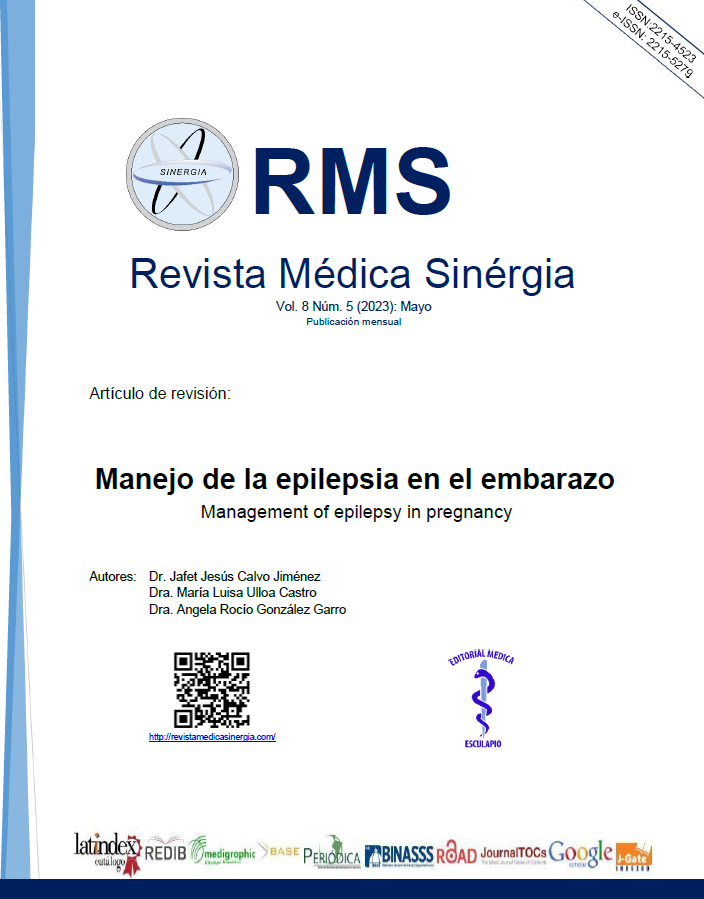Abstract
Epilepsy is one of the most common chronic neurological conditions, with an estimated 1.2% of the population having an active diagnosis of epilepsy. This makes epilepsy the most frequent major neurological complication in pregnancy. Management strategies for epileptic women wishing to become pregnant mainly involve family planning and counselling. It is important to inform about contraception, the need to plan the pregnancy, the optimization of antiepileptic drugs, folate supplementation and the possible risks of antiepileptic drugs on the fetus, particularly if valproate is used. Epilepsy is not a contraindication to pregnancy and the patient should be instructed that most pregnancies proceed without any problem, and unnecessary worries should be avoided. It must also be reported that contraceptives have interaction with antiepileptics, due to this there is a risk that the effect will be reduced, either that of contraception or the anticonvulsant effect. Ideally, adequate control of epileptic seizures is sought to plan pregnancy, because it has been shown that women who have not had epileptic seizures in the last 9 months will probably not suffer any change in their condition. It is important to know the pharmacokinetics of antiepileptic drugs during pregnancy, monitor their serum levels, and adjust the dose according to the results. With regard to childbirth, epilepsy is not considered a reason for caesarean delivery unless a seizure occurs during labor. The objective of this review is to demonstrate the importance of managing epilepsy during and prior to pregnancy, with emphasis on the care of women with epilepsy in the prenatal, perinatal, delivery and postpartum stages, as well as to demonstrate the potential fetal risks and the management of antiepileptic drugs during pregnancy.
Keywords
References
Yi Li B, Meador K. Epilepsy and Pregnancy. Continuum [internet]. 2022 [citado 20 de enero de 2023]; 28(1): 34-54. Disponible en: https://doi.org/10.1212/CON.0000000000001056
Harden C, Lu C. Epilepsy in Pregnancy. Neurologic the Clinics [internet]. 2019 [citado 20 de enero de 2023]; 37: 53-62. Disponible en: https://doi.org/10.1016/j.ncl.2018.09.008
Johnson E. Seizures and Epilepsy. Medical the Clinics [internet]. 2019 [citado 20 de enero de 2023]; 103 (2): 309-324. Disponible en: https://doi.org/10.1016/j.mcna.2018.10.002
Dupont S, Vercueil L. Epilepsy and pregnancy: What should the neurologists do?. Revue Neurologique [internet]. 2021 [citado 20 de enero de 2023]; 177(3): 168-179. Disponible en: https://doi.org/10.1016/j.neurol.2021.01.003
Bui E. Women´s Issues in Epilepsy. Continuum [internet]. 2022 [citado 20 de enero de 2023]; 28(2): 399-427. Disponible en: https://doi.org/10.1212/CON.0000000000001126
Craig J, Scott S, Leach J. Epilepsy and pregnancy: identifying risks. Practical Neurology [Internet]. 2021 [citado 20 de enero de 2023]; 22: 98-106. Disponible en: https://doi.org/10.1136/practneurol-2019-002304
Tomson T, Battino D, Bromley R, Kochen S, Meador K, Pennell P, Thomas S. Management of epilepsy in pregnancy: a report from the International League Against Epilepsy Task Force on Women and Pregnancy. ILAE Epileptic Disorders [internet]. 2019 [citado 20 de enero de 2023]; 21(6): 497-517. Disponible en: https://doi.org/10.1684/epd.2019.1105
Błaszczyk B, Miziak B, Pluta R, Czuczwar S. Epilepsy in Pregnancy—Management Principles and Focus on Valproate. International Journal of Molecular Sciences [internet]. 2021 [citado 20 de enero de 2023]; 23(3): 1-22. Disponible en: https://doi.org/ 10.3390/ijms23031369
Pennell P, McElrath T. Risks associated with epilepsy during pregnancy and postpartum period. Up to Date. 2022 [citado 20 de enero de 2023]; 1-38.
Pennell P, McElrath T. Management of epilepsy during preconception, pregnancy, and the postpartum period. Up to Date. 2022; 1-38.
Stephen L, Harden C, Tomson T, Brodie M. Management of epilepsy in women. Lancet Neurology [internet]. 2019 [citado 20 de enero de 2023]; 18(5): 481-491. Disponible en: http://dx.doi.org/10.1016/ S1474-4422(18)30495-2
Joung W. Pregnancy and Childbirth Experiences of Women with Epilepsy: A Phenomenological Approach. Asian Nursing Research [internet]. 2019 [citado 20 de enero de 2023]; 13: 122-129. Disponible en: https://doi.org/10.1016/j.anr.2019.02.005
Pennell P, French J, May R. Changes in Seizure Frequency and Antiepileptic Therapy during Pregnancy. New England Journal of medicine [internet]. 2020 [citado 20 de enero de 2023]; 383(26): 2547-2556. Disponible en: https://doi.org/10.1056/NEJMoa2008663
Jeon J, Bae J, Kim K, Cho Y. Pregnancy and Epilepsy: a Korean Tertiary Epilepsy Center Review. Journal of Korean Medical Science [internet]. 2020 [citado 20 de enero de 2023]; 35(19): 1-9. Disponible en: https://doi.org/10.3346/jkms.2020.35.e119
Arfman I, Wammes‑van der Heijden E, ter Horst P, Lambrechts D, Wegner I, Touw D.Therapeutic Drug Monitoring of Antiepileptic Drugs in Women with Epilepsy Before, During, and After Pregnancy. Clinical Pharmacokinetics [internet]. 2020 [citado 20 de enero de 2023]; 59: 427-445. Disponible en: https://doi.org/10.1007/s40262-019-00845-2
Macfarlae A, Greenhalgh T. Sodium valproate in pregnancy: what are the risks and should we use a shared decision-making approach?. BMC Pregnancy and Childbirth [internet]. 2018 [citado 20 de enero de 2023]; 18(200): 1-11. Disponible en: https://doi.org/10.1186/s12884-018-1842-x
Kaplan Y, Demir O. Use of Phenytoin, Phenobarbital Carbamazepine, Levetiracetam Lamotrigine and Valproate in Pregnancy and Breastfeeding: Risk of Major Malformations, Dose-dependency, Monotherapy vs Polytherapy, Pharmacokinetics and Clinical Implications. Current Neuropharmacology [internet]. 2021 [citado 20 de enero de 2023]; 19: 1805-1824. Disponible en: https://doi.org/10.2174/1570159X19666210211150856

This work is licensed under a Creative Commons Attribution-NonCommercial 4.0 International License.
Copyright (c) 2023 Array


